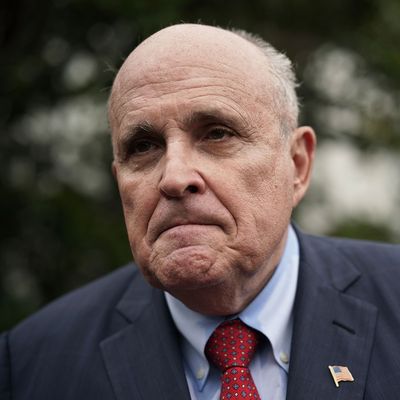
For those who spent the weekend enjoying themselves rather than fretting about the future of American democracy, we just learned that the constitutional crisis looming over the Russia investigation is already underway. The New York Times obtained a 20-page letter Trump’s attorneys sent Special Counsel Robert Mueller’s team in January, arguing that he could not have obstructed justice because he has total, unfettered authority over the Justice Department. Trump could “terminate the inquiry or even exercise his power to pardon if so desired,” they claim.
On Sunday Rudy Giuliani — who replaced John Dowd, one the attorneys who penned the letter — went on TV to elaborate on this expansive view of executive power. As usual, Giuliani gave a freewheeling performance that generally made his client sound guilty. He tried to distance himself from the arguments laid out in the letter, telling This Week that his predecessor put forth “the broadest possible point,” but “we don’t have to go there” because there are less constitutionally questionable ways of proving Trump’s actions were justified.
When pushed, however, Giuliani said he generally agrees that the president has stunningly broad powers — even if using them would be political suicide. He said that while he believes the courts would conclude the president has the right to pardon himself, it’s “unthinkable” as it would lead to “immediate impeachment.”
When George Stephanopoulos asked if the president could shut down an FBI investigation into whether he’d accepted a bribe or committed murder, Giuliani replied:
I would not go that far. I would not go that far, George. I mean, John — you’d have to ask John exactly what he’s relying on for that. I wouldn’t go that far. I think under circumstances where there’s no — at best there’s ambiguity as to whether there was intent.
But in his conversation with NBC’s Meet the Press, Giuliani was more confident that the president is constrained only by “Congress’s impeachment power,” not his own Justice Department. He said that while he only agrees with about 80 percent of the argument laid out by Trump’s former legal team, he thinks a sitting president can’t be indicted or subpoenaed. “That’s the part of it I agree with the most,” he said. “Can’t be indicted, can’t be questioned because it interferes with the presidency.”
By the end of the day, Giuliani had come up with a far more concise, and vivid, explanation of the president’s powers. “In no case can he be subpoenaed or indicted,” Giuliani told HuffPost Sunday night. “I don’t know how you can indict while he’s in office. No matter what it is.”
Echoing Trump’s claim during the campaign that he could shoot someone in the middle of Fifth Avenue and not lose any voters, Giuliani explained that if there’s a criminal in the Oval Office, the law can’t touch him until the Legislative branch acts.
“If he shot James Comey, he’d be impeached the next day,” Giuliani said. “Impeach him, and then you can do whatever you want to do to him.”
Scholars are actually divided on whether the president can be indicted, but there is general agreement that the easiest way to deal with a felonious president is to impeach him first, and then indict. As George Washington University law professor Jonathan Turley notes, for decades pondering this question has been a parlor game among constitutional-law professors, along with “presidential emoluments, self-pardons, and presidential obstruction.” Now the Trump administration,”has the dubious distinction of moving all of these questions from the realms of the hypothetical to the actual.”
Though Giuliani was speaking theoretically, it’s still stunning to hear the president’s lawyer musing about him murdering a specific political enemy and getting away with it — or at least, it should be.
It’s easy to dismiss Giuliani’s media ramblings, especially because half the time they seem to hurt the president’s case. But occasionally some truth slips out, like when he admitted to CNN last week that the strategy behind the Spygate push is to shift public opinion against Mueller, “because eventually the decision here is going to be impeach or not impeach.”
In one day, Giuliani went from arguing that the president probably has the right to impede an investigation and pardon himself, to saying that he can’t even be indicted for murder. Though he repeatedly claimed that the president has no interest in doing any of this, he put forth the idea that the president is above the law in every imaginable scenario — and once we’re debating the legality of our kinglike president committing murder, a little obstruction of justice doesn’t seem like a big deal.
Giuliani assures us that we don’t have to worry about there being no legal check on Trump’s power (according to his interpretation), because if the president commits criminal acts there’s a political solution: impeachment. But it’s already unclear what Trump would have to do for the Republican-controlled legislature to turn on him, and Giuliani is trying to wear away the political will to hold the president accountable for anything but the most heinous crimes.






























